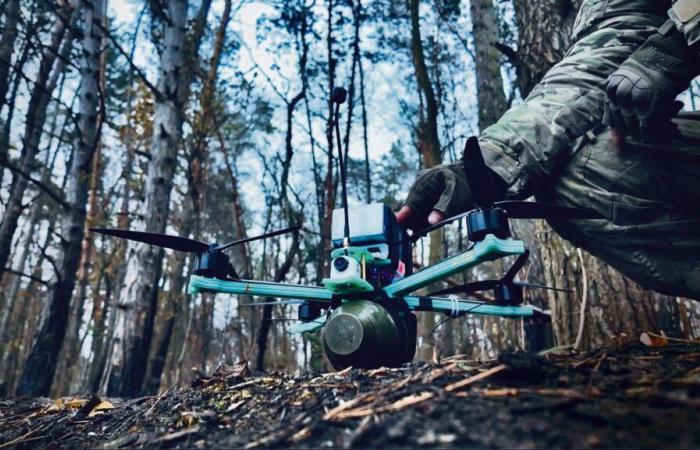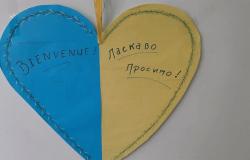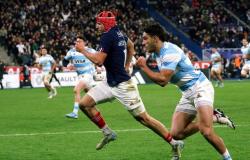Sergei starts. If he doesn't use the anti-drone jammer, it's because, he says, it uses up the 4×4's battery very quickly. The reconnaissance to the village of Nizhnemakhovo will be short. There would be a risk of not being able to restart the vehicle to drive away. The day falls. The skeletons of houses parade along the road with thick forests between each village. While driving, Sergei warns us that the most serious danger awaiting us at this hour is called “Baba Yaga”, a huge Ukrainian drone five meters in diameter formerly used for agricultural spraying.
Transformed into a weapon of war, it gives a kind of spaceship capable of dropping 120 mm mortar shells which can destroy a house. Moreover, the first, in the village of Nizhnemakhovo, was recently visited by Baba Yaga. In Slavic mythology, it is the old witch who scares children. Of the dwelling, Baba Yaga will have left only a few sections of tottering walls sending the soldiers who occupied it from life to death.
Archaism and ultra-modern technology
Sergei parks his 4×4 under a tree and we enter the village on foot. The light is fading. A sticky mix of light rain and snow is falling. On the main road, we can see soldiers on quad bikes driving with their lights off. The last Russian positions are a few hundred meters away. Afterwards, it's no man's land, the gray zone that no one really controls, then the Ukrainian positions and the town of Soudja which they have made their HQ in the Kursk oblast. “There’s no point driving without headlightsSergei points out. Ukrainians have thermal sensors. Better to leave them on. If one of their drones attacks you, we can at least try to escape. »
Returning to the vehicle, Sergei says more about his very special life among drones: “A kamikaze FPV drone can go up to 120 km/h. With the Mitsubishi Outlander pickup that we have at base, we can lose it. But it depends on the terrain. With an armored vehicle, it's impossible. Otherwise, you have to put someone in the back with a shotgun or brake and abandon the vehicle in a hurry, which then gets hit by the drone. » A hunting rifle? Against a drone? This is surely true, because there were several in the house occupied by the Russian soldiers.
“I kill more with a drone than with a howitzer”
This mixture of archaism and ultra-modern technology is the hallmark of this Ukrainian war. Sergei and his team are a new breed of fighters. With their drones, they made the tank obsolete. Once sovereign of the battlefield, he is now hunted and only serves as artillery. With the drone, the sniper has also lost his place. Why send a guy with his rifle to shoot down a single opponent, while a drone eliminates several? The scout also belongs to the past. The drone can do all this. Between that of reconnaissance and the kamikaze to strike, it has become the keystone, with a single objective: to destroy the adversary. “I kill more with a drone than with a howitzer”will confirm a soldier from the team. This partly explains why progress has been slow for two years on the front.
The rest after this ad
Any concentration of troops and armored vehicles is immediately spotted and dealt with by drones in coordination with artillery. This is why infantry combat is more limited. Sergei is well aware of this. He also regrets that in this month of November, there are fewer targets to “deal with” than last August, when his unit was hastily summoned from Donbass to stop the Ukrainian incursion into Russian territory.
Initially, the drone pilots' mission was to protect the Kourchatov power plant located further north, which was the Ukrainians' number one objective. The border guards had been cut to pieces by elite Ukrainian units during their blitzkrieg. A formation of Chechens present on site proved incapable of reacting. The military value of Kadyrov's men is often called into question by Sergei, who has worked with them since the Battle of Mariupol. It was the regular army which finally reacted to stop the Ukrainians, undoubtedly motivated by the fact that a foreign power was invading Russia and that this had not happened since 1941.
The Ukrainian avant-garde almost seized this antiquity, a cousin of Chernobyl, right under the noses of the Russians, perhaps a little too confident in their imminent victory and who had neglected to monitor their border. Zelensky and his army nevertheless cling on while, from Kupiansk to Zaporizhia via Kurakhovo, Pokrovsk and Toretsk, Ukraine is retreating on all other fronts. The reason? Trump or no Trump, as long as there are Ukrainians on Russian land, Putin will not negotiate. Continuing the war is the Ukrainian president's raison d'être. It's also a risky bet, with Ukraine risking losing even more territory in the end…
The outcome of the war rests in part on these geeks fed up with video games
Seen from the outside, the drone pilot looks like an ordinary soldier, except that, in his schedule, everything is out of sync. He stays up late, working on his equipment, but also on simulators and video games which are reminiscent of the nocturnal activities of our teenagers. His food also resembles theirs: pizzas, burgers and energy drinks ordered in town from Kourchakov, rather than the chicken pasta and cabbage served in the dining hall when they are on base. Waking up is sometimes difficult. Unless there is an emergency, at 10 a.m., no one is up. At home, we would yell at them, here, we indulge their every whim because the outcome of the war rests in part on these geeks fed on video games.
Elite drone pilot, Vlad is checking an antenna that will allow him to work up to 20 kilometers inside the enemy system.
© Julie Perron/Omerta
At night, on the front, on the other hand, Sergei and his deputy Vlad are up around 1 o'clock. “ Baba Yaga – The Best Of Baba Yaga »announces Sergei. The radio crackles. Tonight is a full moon. Ideal for an agricultural drone transformed into a killer seeking its harvest of Russian blood. Sergei equips himself then goes out to listen at night. When he returns, he lights a cigarette and begins to study the map on his tablet where he received the data for the next day's objectives. They must launch four FPV drones on positions located on Soudja, the Ukrainian HQ. He then shows the card to his assistant Vlad, also an insomniac. The clock is ticking. Sleep wins. We leave the two soldiers “okay” sleep through the night. They are now watching a movie on their cell phones. The screen lights up their faces. Around, the other soldiers are snoring.
Drone pilot here is the dream life. We are certainly the number one target of the Ukrainians on the battlefield, but this title comes with some privileges, such as that of escaping infantry attacks where lifespan is reduced. This is why, for example, Vlad chose drones. His comrades nicknamed him “the deserter”. Strictly speaking, it is. He abandoned his battalion in Donbass to join Sergei. It was for a good cause. He is better served here as an elite drone pilot than guarding a trench in Donbass.
A Frenchman in the war
Sergei stands out from the other soldiers with his impeccable French. Normal, he's French. Russian too, but only since last September. Born to a Ukrainian mother and a French father. Formerly of the Military Prytanée of La Flèche, without the war in Donbass, he would have made a career as an officer in the French army. In 2014, the Maidan revolution turned his life upside down. Initially, he supported supporters of an independent Ukraine and nationalists. But the secession of the populations of Donbass from kyiv made him change his mind. He will then go there secretly the first time.
In 2015, he was removed from the ranks of the French army. For him, this war is an intimate affair. His uncle took the side of kyiv. They cut off all contact. In France, he is accused of having tried to join Wagner or of being an agent of the FSB. Sergei denies. Firmly committed to Putin's army, not being able to see his other country, France, makes him unhappy. Today, Sergei is not the only Frenchman to fight on the Russian side among the drone fighters. There is Gautier who arrived a few days ago. He is also a former soldier. The drone unit was named “Normandy-Niemen”, in memory of the French aviators who came to fight alongside the Soviets during the Second World War.
The drone passes and explodes a few meters from the team
Upon waking up, Vlad checks an antenna which is used to amplify the signal and will allow them to “work” up to 20 kilometers inside the enemy device. Drone warfare is a matter of frequencies that we use until the adversary jams them. Sergei asks if we speak Chinese. He would like to understand the instructions for a new drone.
The pick-up from the day before had a flat tire. It must be repaired. A trifle for these men, but it still cost us an hour. Then, it's departure, towards an area located east of the village visited the day before. Arriving at the edge of a wood, the men take the equipment out of the pick-up which they then hide. Vlad then climbs a tree to attach his antenna. They connect, place the charges under the drones, RPG rocket warheads and grenades. The observation drone is launched first. Then the FPVs follow. The first two head towards a gas station frequented by Ukrainian soldiers in the suburb of Soudja. They are too heavy. Their battery is draining at full speed. The drones will fall before reaching the objective. The next two will hit the mark.
Just after the last one is launched, Vlad realizes that he has inadvertently captured the video frequency of a drone that is not theirs. It's common. Vlad initially thinks it is a drone from another unit. But, looking at the image, he realizes that the position he is heading towards is his own. It is a Ukrainian drone whose frequency they have picked up and it is heading straight towards them to blow itself up. Fighting action. We drop everything to take refuge in the undergrowth. The drone passes and explodes a few meters from the team.






